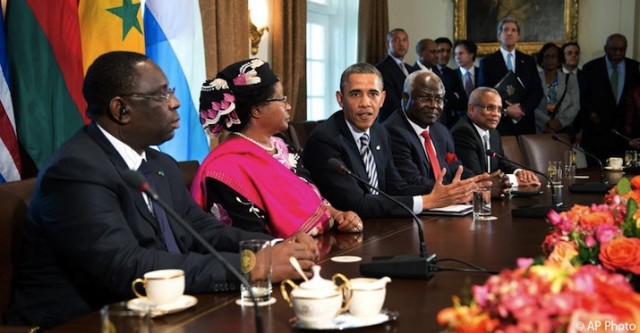Two weeks ago President Obama concluded his eight-day long trip to three countries in sub-Saharan Africa, the longest visit to the region he has made as US President. His tour visited Senegal, South Africa and Tanzania, concluding with a visit to a monument to Americans killed in the 1998 terror attack in Dar Es Salaam. Meeting with foreign leaders, the President laid out three specific initiatives he will be launching to help foster greater economic development and trade relations with the United States. The first is a $7 billion infrastructure proposal aimed at increasing electrical capacity across the region, which has been cited as a major hindrance to economic development. The second is a trade deal, known as the United States-East African Community Trade and Investment Partnership, which will help facilitate greater investment by American companies in the East African region. The third initiative is a planned 2014 summit in Washington which will invite leaders from across Sub-Saharan Africa to discuss diplomacy and trade with American officials, meant to help further solidify partnerships.
[captionpix align=”left” theme=”elegant” width=”300″ imgsrc=”http://natoassociation.ca/wp-content/uploads/2013/07/ObamaSouthAfricaSpeech.jpg” captiontext=””]
The President may have only visited three countries over the course of his trip, but they were used primarily as pedestals from which he reached out to the entire continent. None of his three large initiatives were limited to the countries he visited, and each of them filled important niches in what is being touted as a new era of American policy toward Africa. Assistance in power generation, a key facet in development, followed by an agreement with the East Africa Community (EAC) – an explicit trade deal with some of the largest economies in Africa, and finally a call for greater diplomatic ties with the United States through a summit in Washington comprises a holistic approach to gaining a political foothold on the continent. With this visit, Obama has demonstrated the desire of the United States to increase its role in Africa’s three most important areas; its economic development, its trade relations, and its diplomatic ties. It is clear that the President is trying to cover as much ground as possible, building up the confidence of African politicians and citizens alike, while laying the groundwork for greater American economic and diplomatic clout.
While the primary objective of the trip was to foster greater ties with African nations, it also had the larger goal of confronting criticisms that the administration has neglected the region in its foreign policy outlook. For much of the President’s time in office, the involvement of the United States and other Western countries in African affairs, at least in terms of public perception, have been limited to anti-terrorism military endeavors. It has been seen as largely reactive, as opposed to proactive and with a concrete plan of development and trade in mind. The US-backed Ethiopian invasion of Somalia in 2007, the NATO intervention in Libya in 2011, the French intervention in Mali this past year, and the creation of the United States Africa Command in 2008 have all contributed to this perception.
It is important that the United States counter this perception, as well as make up for lost ground in African trade relations. The African economy as a whole has grown tremendously over the course of the last decade, averaging at about 5% a year and is more amenable to trade and investment than it ever has been before. Despite the lack of action on the part of the United States government, trade between the United States and Africa has more than doubled since 2003 to $100 billion. While constituting a large increase, it remains a disproportionately small percentage of total American trade, which in 2012 was over $3.8 trillion.
The largest foreign player in Africa is China, who in that same year had more than double the amount of trade with Africa as the United States. The differences in policy between the two countries is stark. While Obama is touting what will soon be the first summit of African leaders in the United States, China has held numerous China-Africa summits, having created the Forum on Africa-China Cooperation over a decade ago. China is not alone in this regard. Other countries, such as Japan, Brazil and India, have also held such summits in the past, leading to billions in added investment. Additionally, while Obama has now completed his first ever major trip to the continent, the track record of high ranking Chinese officials visiting African nations far outstrips his.
This lagging behind in trade relations with Africa is all seen against the backdrop of the increasing strategic importance of Africa’s resource wealth. The continent holds at least 10% of the world’s oil reserves, a third of its cobalt deposits, and already supplies China with half of its copper, aluminum, and iron. At the same time, Africa will be home to 2 billion people by 2050, and domestic markets for materials and products will have increased significantly. This is the fundamental opportunity for growth that American and Western businesses need to consider. In the past, especially in the 1990s, Africa was rightly considered a more risky region to invest due to its problems of instability and poor governance. Now, however, American policy makers need to change their attitude.
With all of these factors in mind, it is clear that this trip was long overdue, and the United States needs to do more to foster more comprehensive and long term relationships with African nations. A forum with which to regularly interact with African nations similar to that used by China and other nations needs to be established. Additionally, as former US trade representative for Africa Rosa Whitaker has suggested, the United States government needs to do more to foster American investment that encourages development in Africa. This includes tax incentives for companies that invest beyond just the extractive sectors, a historically poor means of growth, as well as tax credits for companies that import goods from certain sectors in Africa. Finally, legislation such as the African Growth and Opportunity Act, which helped streamline trade between participant African nations and the United States, must be expanded.
Not pursuing these changes would come not only at an economic cost, but also a political one. African nations make up one of the largest voting blocs in the United Nations, with a number of spots on the Security Council. While they have not always voted uniformly, ensuring the goodwill of any of these nations would go a long way. Establishing the good will of these nations then, who have also been approached by nations such as China for this specific reason, will be crucial to the success of Western initiatives at the organization.




